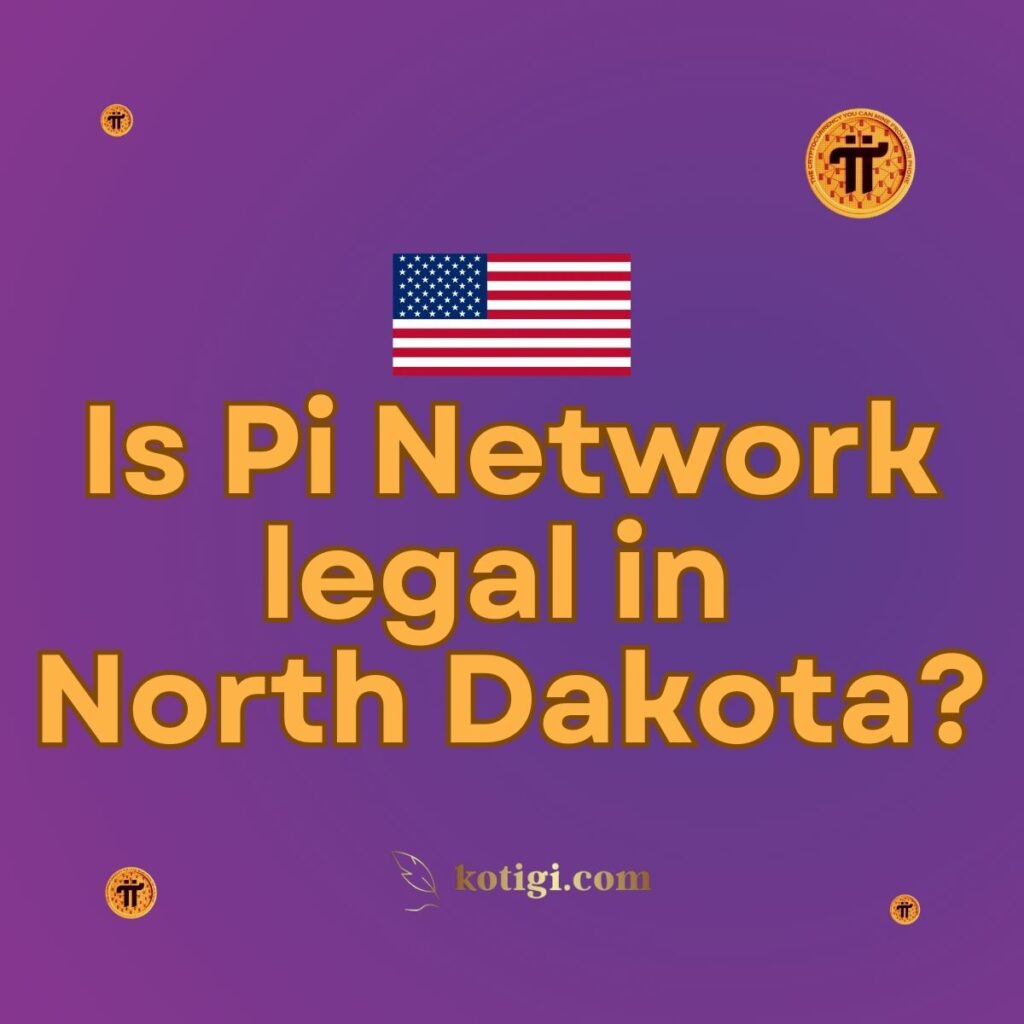
Is Pi Network legal in North Dakota?
Understanding the legal landscape for Pi Network in North Dakota is essential for users and investors in this innovative cryptocurrency. Although there are no explicit prohibitions on using Pi Network in the state, users should stay aware of compliance requirements related to cryptocurrency regulation.
Introduction
The Pi Network has rapidly gained popularity as a mobile-based cryptocurrency, aiming to make digital assets accessible to the general public. For potential users and investors in North Dakota, it’s essential to understand the legal aspects of engaging with this platform. North Dakota, while less restrictive in its regulatory approach to cryptocurrencies compared to some states, still has specific compliance requirements that must be considered. This article provides an in-depth exploration of the legal status of Pi Network in North Dakota, covering regulatory frameworks, compliance guidelines, and insights for local users.
Overview of Cryptocurrency Regulations in North Dakota
General Cryptocurrency Laws
In North Dakota, cryptocurrency is treated as a digital asset rather than a legally recognized currency. There are no dedicated laws exclusively governing the use of digital assets like Pi Network, and instead, general state financial regulations apply. However, the lack of concrete regulation in this area can sometimes lead to ambiguity, leaving users to interpret federal and state guidelines on their own. The North Dakota Securities Department plays a role in overseeing any cryptocurrency projects that may be classified as securities, ensuring consumer protection.
Money Transmission Requirements
For cryptocurrency platforms operating in North Dakota, money transmission laws are relevant. Although Pi Network does not currently facilitate direct fiat-to-crypto exchanges within its app, future developments involving currency transactions may necessitate compliance with the state’s money transmitter requirements. This could include registering as a money services business if any transactions involve the exchange of Pi coins for fiat currency.
Federal Cryptocurrency Regulations
North Dakota residents are also subject to federal cryptocurrency regulations. The Financial Crimes Enforcement Network (FinCEN) and the Securities and Exchange Commission (SEC) have issued various guidelines and mandates for cryptocurrency-related businesses, particularly those dealing in assets or transactions that could be classified as securities.
User Compliance with Know Your Customer (KYC) Standards
KYC Requirements for North Dakota Residents
The Pi Network encourages its users to complete KYC (Know Your Customer) procedures to validate identities and deter fraud. KYC compliance is particularly important for users in North Dakota, as failure to meet these standards could lead to limitations in the event that they want to exchange their Pi coins in the future.
Advantages of KYC Compliance
Completing the KYC process helps ensure that users remain compliant with both federal and state regulations, thereby enhancing trust and security within the platform. Users who pass the KYC process may benefit from fewer restrictions when Pi Network integrates with traditional financial systems, as their identity validation can contribute to smoother transactions.
Data Privacy Concerns
KYC procedures often require sensitive information, raising concerns about data privacy. Pi Network has stated that it is committed to data protection, but North Dakota users should remain vigilant and aware of how their personal information is used. Familiarity with North Dakota’s data protection regulations and Pi Network’s privacy policies can help users make informed decisions.
Implications for Mining Pi in North Dakota
Legality of Mobile Mining
Unlike traditional mining methods that require significant computing power, Pi Network allows users to mine Pi coins through their mobile devices. In North Dakota, mobile mining does not face any specific restrictions as long as it does not involve excessive energy consumption or disrupts the state’s telecommunications infrastructure. This distinction makes Pi mining accessible to North Dakota residents, provided they follow general cybersecurity practices to protect their devices.
Energy Consumption and Environmental Considerations
While Pi Network’s mobile mining is considered energy-efficient compared to traditional mining, North Dakota residents should still consider the environmental impact of their activities. North Dakota has policies aimed at promoting energy conservation, and users are encouraged to adopt responsible mining practices.
Consumer Protection and Fraud Prevention
Protecting Users from Scams
The rise of cryptocurrencies has brought with it an increase in online scams. North Dakota’s consumer protection laws are designed to shield residents from fraud, emphasizing the importance of using reputable platforms. Although Pi Network has built-in security features, users should remain cautious and verify any claims made by third parties to avoid potential scams.
Pi Network’s Security Measures
Pi Network incorporates various security protocols to protect its users’ assets and data. The app’s emphasis on identity verification through KYC and secure mining processes aligns with North Dakota’s goal of minimizing fraud risk in online activities.
Taxation and Reporting Requirements
Tax Obligations for Cryptocurrency Earnings
In the U.S., cryptocurrency transactions are subject to tax, with profits treated as capital gains. This requirement extends to North Dakota residents who mine Pi, trade it, or use it for transactions. Understanding the tax implications is essential for users who wish to stay compliant with the Internal Revenue Service (IRS) and North Dakota’s tax policies.
Record-Keeping Recommendations
To simplify the tax reporting process, North Dakota residents are encouraged to maintain accurate records of their cryptocurrency activities. Documenting the dates, amounts, and purpose of each transaction can help users track their obligations and avoid penalties during tax season.
Potential Future Changes in Tax Laws
As cryptocurrency adoption continues to grow, state lawmakers may adjust tax policies accordingly. Staying updated on any tax-related developments can help North Dakota users prepare for potential changes in cryptocurrency tax treatment.
Community Support and Resources in North Dakota
Cryptocurrency Meetups and Local Forums
North Dakota has a growing cryptocurrency community, including local groups that host meetups and events. Joining these communities can provide Pi Network users with valuable insights, helping them stay informed about regulatory changes and best practices.
Educational Resources and Awareness Campaigns
The state promotes financial literacy and has initiatives aimed at educating residents about emerging financial technologies. For Pi Network users, these resources can serve as a valuable tool for understanding how to use cryptocurrencies responsibly and in compliance with local laws.
Conclusion
In summary, Pi Network is legal to use in North Dakota, as there are no specific state laws prohibiting its activities. Users should be aware of general compliance obligations related to KYC, consumer protection, and taxation. By staying informed and participating in local communities, North Dakota residents can engage with Pi Network in a secure, legally compliant manner.
Key Takeaways
- Pi Network is legal in North Dakota without specific prohibitions, though compliance with general cryptocurrency regulations is advised.
- KYC compliance is essential for smooth future transactions on the Pi Network.
- Consumer protection laws in North Dakota encourage users to engage cautiously and avoid scams.
- Tax obligations apply to cryptocurrency earnings, and users should maintain accurate records for reporting.
- North Dakota residents can benefit from local cryptocurrency communities and educational resources to stay informed.





